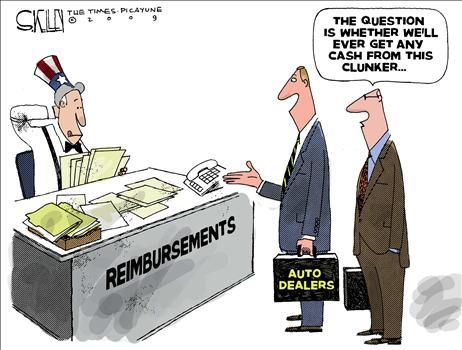[HT:LC]
A vehicle at 15 mpg and 12,000 miles per year uses 800 gallons a year of gasoline.
A vehicle at 25 mpg and 12,000 miles per year uses 480 gallons a year.
So, the average clunker transaction will reduce US gasoline consumption by 320 gallons per year per vehicle.
They claim 700,000 vehicles – so that's 224 million gallons year.
That equates to a bit over 5 million barrels of oil.
5 million barrels of oil is about 1/4 of one day's US consumption.
And, 5 million barrels of oil costs about $350 million dollars at $75/bbl.
So, we all contributed to spending $3 billion* to save $350 million.
How good a deal was that ?
They'll probably do a great job with health care though.
.
Wednesday, September 9, 2009
Did anyone run the numbers
Subscribe to:
Post Comments (Atom)














1 comment:
Your math is wrong. You claim 224 million gallons of gas a year equates to 5 million barrels of OIL. One barrel of oil is 42 gallons. But you can't get 42 gallons of gas from a 42 gallon barrel of oil (to do so would be a violation of the law of conservation of energy). You can get 19 to 20 gallons of refined gas suitable for automobiles from 1 barrel of oil. Plugging this back into your other assumptions renders an annual savings of $875 million. Also, your claim that spending $3 billion to save $350 million is only true if everyone stopped driving there car after one year since this is the annual savings. Using $875 million in savings, the program pays for itself in 3.5 years if the average owner holds for that long. Most people hold there cars for over 5 years.
Post a Comment